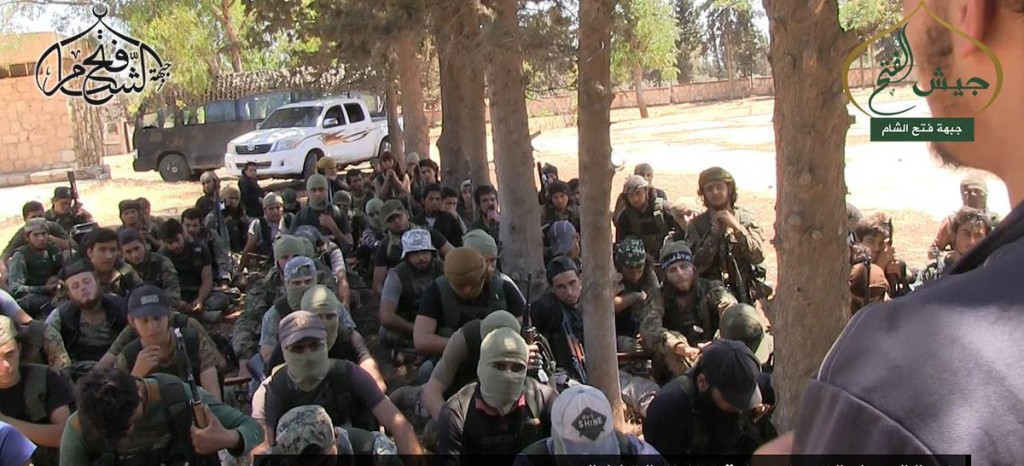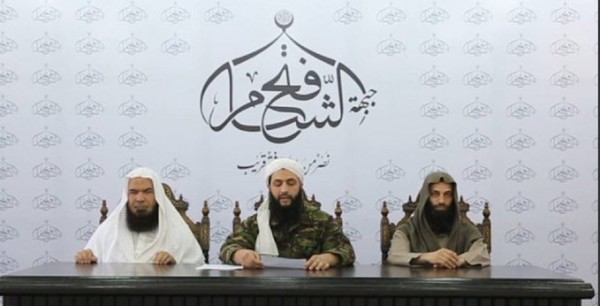PHOTO: Jabhat al-Nusra leader Abu Muhammad al-Joulani announces the rebranding of the Syrian group as Jabhat Fatah al-Sham, July 28, 2016
Published in partnership with The Conversation:
The jihadist organisation Jabhat al-Nusra (aka the al-Nusra Front), involved in Syria’s civil war since 2012, announced in a video that it is formally detaching itself from al-Qaeda. The move, which had been negotiated for well over a year, was confirmed on July 28.
In the video, Nusra leader Abu Mohammad al-Joulani said the detachment was “in the necessity of the continuity of the jihad of al-Sham [Syria]”. Renamed as Jabhat Fatah al-Sham (the Front for the Conquest of Syria), Nusra will try to bring other rebel factions into a unified body, which al-Joulani says will represent “the masses of the people, liberating their lands, giving victory to their faith, and upholding their testimony of faith”.
See Syria Video: In 1st Public Appearance, Nusra’s al-Joulani Announces Separation from Al-Qa’eda
Some US-based observers quickly reacted with suspicion and derision. Thomas Joscelyn in the Long War Journal dismissed the statement as propaganda with no substance: “Even if Joulani did say that his group had really split from al-Qaeda (which he didn’t), there is no good reason to believe him.” White House spokesman Josh Earnest commented: “There continues to be increasing concern about Nusra Front’s growing capacity for external operations that could threaten both the United States and Europe.” Earnest’s State Department counterpart John Kirby was more dismissive: “They are still considered a foreign terrorist organisation. We judge a group by what they do, not by what they call themselves.”
These reactions were all too predictable. They were also misguided, and the thinking behind them is damaging.
For most Western onlookers, dealing with Nusra (like the Syrian conflict at large) is above all a matter of counter-terrorism that is somewhat distinct from the fundamental and still primary cause of the Syrian conflict: a challenge to Bashar al-Assad’s regime, whose violent response has killed hundreds of thousands and displaced millions.
At the root of the problem is that most pundits and officials outside the Middle East generally have a poor sense of the way the forces active in Syria are related to each other. The reactions to Nusra’s announcement duly made no reference to the group’s years of battle against Assad’s regime and now the Islamic State, which originally spawned the group but which is now its bitter rival. They also overlook the anti-Assad movement’s bitter internal fight over who can wield authority and legitimacy.
Uncertain about what to do and caught up in its own simplistic vision of the terrorist enemy in Syria, the Obama administration is ploughing on with its counter-terrorism-first strategy of focused aerial attacks on IS and other groups – regardless of whether its approach might actually prolong the Syrian catastrophe.
A Syrian force
It’s certainly true that Nusra developed out of al-Qaeda. In 2012, IS, then affiliated with al-Qaeda, sent al-Joulani and others into Syria to establish the movement in the fight against the Assad regime.
But as al-Joulani also says in the “divorce” video, Nusra has always considered itself a Syrian rather than a transnational movement. This is a crucial point. Most of Nusra’s recruits were and are local Syrian men looking to join a well-armed faction that could take on Assad’s military. Where it sees common cause, Nusra fights alongside rebel factions, and it seeks influence in the governance and legal systems being set up across much of rebel-controlled Syria. This puts it at odds with IS, which is primarily a “foreign” movement of fighters and leaders from outside Syria.
And yet, the Obama administration has stuck to its mantra that “Nusra is al-Qaeda” – and this has become a rationale for withholding and even withdrawing support for Syrian rebel forces challenging the Assad regime.
Reducing the Syrian issue to “counter-terrorism” underpinned the US’s September 2014 decision to bomb not only IS, but Nusra as well. The first strikes were carried out on the pretext that a mysterious “Khorasan Group” was working within Nusra to plan attacks on the US and Europe, and later under the umbrella of the fight against Islamist extremist groups in general. But those raids didn’t just kill terrorists; they killed men from Syrian communities. Their families and neighbours probably don’t share Nusra’s ideology, but do see the virtue of the continuing fight against the Assad regime.
As activists and rebel officers said from the outset of the US strikes: “People are becoming more sympathetic to al-Nusra because they were targeted in the attacks.”

US Secretary of State John Kerry and Russian Foreign Minister Sergey Lavrov
The conflation of Nusra with al-Qaeda is having an even greater political effect. Russia has exploited this premise to bounce the US into accepting its intense aerial intervention, which has propped up the Assad regime since September 2015. Even though Moscow is in fact targeting Syria’s opposition and rebels – killing thousands of civilians and destroying infrastructure such as hospitals, water plants, bakeries, and schools – it can justify hitting areas where Nusra is present because the group’s forces cannot be “separated” from other rebel factions.
Far from taking any action to curb Russia’s campaign, the US has moved to co-operate with it. US Secretary of State John Kerry is now pursuing a joint command-and-control centre to co-ordinate US and Russian aerial operations. This has replaced any real effort to find a political solution, since Assad has ruled out a proposal that he cede power to a transitional governing authority.
Again, the response from the US and foreign policy thinkers, Charles Lister among them, is to advocate building up a “moderate” political and military force against Assad. But this “moderate” alternative is a vague, even abstract confection.
The So-Called Solution
Who is it actually supposed to be made up of? Groups based in Turkey, who have claimed leadership since 2012 but have long been criticised for being distant from the battlefield? Is it the disparate elements of the Free Syrian Army? Is it Ahrar al-Sham, an Islamist group that’s one of the most important actors inside Syria? Or is it Jaish al-Islam, the leading rebel group in central Syria? So far, no answers are forthcoming.

Rebels prepare for the offensive lifting the pro-Assad siege of Aleppo
Instead of working with long-established groups inside Syria, the US military and CIA have tried a series of programmes of vetting, training and equipping “moderate” fighters outside the country, all of which have failed. Meanwhile, the US is now blocking any assistance to anti-Assad factions in southern Syria, and is detached from the critical battlefront in the north-west, where Russia and the Assad regime are have laid siege to opposition-held areas of Aleppo city.
Less than 24 hours after Nusra released al-Joulani’s video, the power of the blended rebel forces was made clear when a rebel-JFS offensive turned the tide in the battle for Aleppo. On August 6, after only eight days, the rebel coalition group Jaish al-Fatah (which Nusra has joined in various offensives) not only broke the joint Russian-regime siege but also threatened to isolate the Syrian military in the areas of the city it controls.
This makes it plain just how arbitrary the West’s categorisations are. For now, whatever label the US and analysts put on Nusra, the rebels need it as a battlefield ally, and any distinction between “moderate” and “extremist” is a political imposition. The US could belatedly recognise the folly of its artificial labels and establish lines of co-operation with the groups inside Syria, or it can continue to obsess over “al-Qaeda in Syria” without considering the situation on the ground.
If it chooses the latter, it will implicitly give way to the Russian-Assad-Iran-Hezbollah alliance’s attempt to bomb, besiege, and starve the opposition and rebels into submission – all in the name of counter-terrorism.
And as the recent events in and near Aleppo have shown, in doing so it accepts the risk of being shoved aside. Giving up on any support from the US, the opposition and rebels will work with Nusra not only to survive, but continue their challenge to the Assad regime.
![]()

